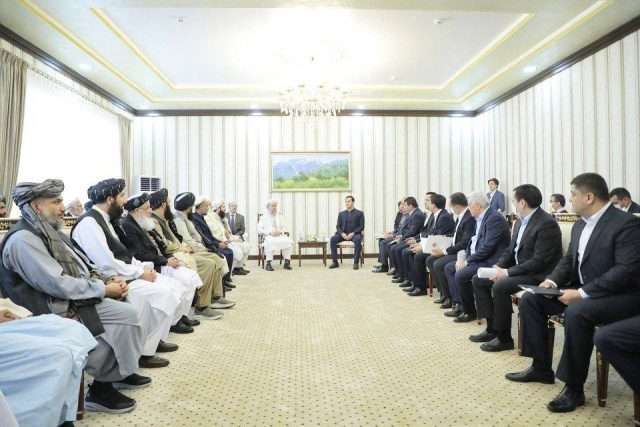
The recent meetings between Uzbek and Taliban official representatives organised to discuss humanitarian assistance and joint economic and infrastructural projects underline Tashkent’s strategy to establish relations with the Taliban government to stabilise its borders and promote an economic partnership considered as necessary for the security and stability of the region.
On October 7th, 2021, the Minister of Foreign Affairs of Uzbekistan Abdulaziz Kamilov visited Kabul to hold negotiations with the Deputy Head of the Interim Government for political issues, Mullah Abdul Kabir. Also, the acting Deputy Prime Minister Abdul Salam Hanafi, Ministers of Transport and Civil Aviation, Public Works, Energy and Water Resources of Afghanistan attended the meeting.
Kamilov held separate negotiations with the acting Foreign Affairs Minister of the Taliban Interim Government Amir Khan Muttaqi and discussed efforts to provide the people of Afghanistan with humanitarian and other assistance and the implementation of large infrastructure projects in the field of energy and transport in the country.
According to the press release of the Ministry of Investments and Foreign Trade of the Republic of Uzbekistan, on October 16th, 2021, in the city of Turmuz, the Taliban delegation led by the acting Deputy Prime Minister Abdul Salam Hanafi met with Uzbek Deputy Prime Minister and Minister of Investments and Foreign Trade Sardor Umurzakov to evaluate issues related to trade and economic interaction, border security, energy cooperation and international cargo transportation. The two parties also talked about the implementation of infrastructure projects, particularly the laying of the Surkhan – Puli-Khumri power line and the construction of the Termez – Mazar – Sharif – Kabul Peshawar railway. The Taliban have expressed their readiness to ensure the safety of Uzbek specialists who will come to work on these projects.
Why does it matter?
Because the recent Uzbek-Taliban meetings highlighted that Tashkent aims at transforming Afghanistan into a bridge for strengthening cooperation between Central and South Asia and minimising possible risks for Uzbek national interests from the Taliban or any terrorist groups that might arise inside the Afghan territory. Analysing the situation around Afghanistan and taking into account the complexity of interests of Uzbekistan, as well as the interests of the Uzbeks of Afghanistan, it seems that Tashkent officially seeks to engage a dialogue with the Taliban to promote its national agenda and guarantee regional security and stability.
Since the Taliban have shown their military capabilities during 20 years of war against the U.S. troops, the Uzbek Government has apparently neither the desire nor the resources to start a conflict with its neighbours. In this context, Uzbekistan wants to demonstrate its ability to build a stable and peaceful Afghanistan and aims at presenting itself as the ideal actor with whom the Taliban and the Afghan community might dialogue and cooperate. Recent meetings between Uzbek and Taliban representatives also confirm the impact that the Taliban Government have on Central Asian dynamics, particularly Uzbekistan and Turkmenistan that are intensifying their cooperation in different fields and creating a joint partnership in connection with the recent developments in Afghanistan to secure their countries and boost their economies (How Afghanistan is influencing the Turkmenistan-Uzbekistan cooperation).



